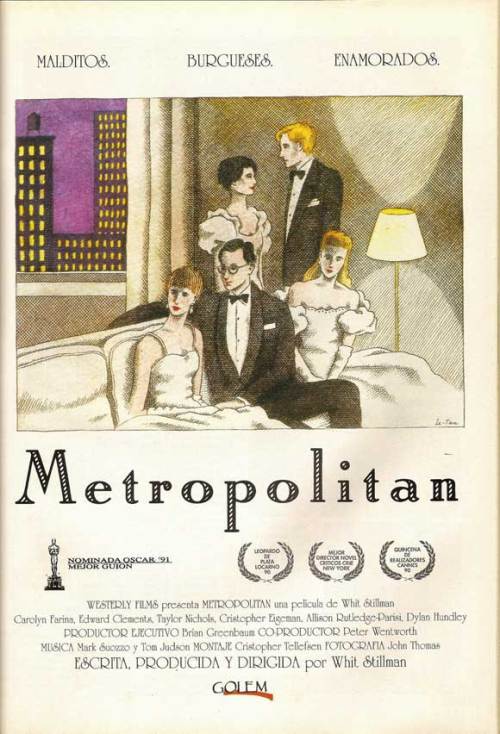
I’ve just watched Metropolitan (1990) on BBC iPlayer and if you happen to be checking-in here in late June I suggest trying to catch it there, as it’s an excellent film. Actually I should say “re-watched”, since I saw this film when I was very young. My parents showed it to me when I was, I’d say, about 12 years old. I remember being very affected by the film at the time, the reason why I’m now tapping these keys at 2.30 am..
The thing I remember being most affected by was the suggestion by the male protagonist Tom Townsend, an ardent socialist in amongst the cream of New York’s “social scene”, that it wasn’t necessary to have read Austen or Tolstoy to have an opinion on their works’ relative merit. Tom has read far too much theory and become detached from the “work itself” the film is partly telling us, yet Tom’s world of ideas is shown respect in this scene:
Anyway this kind of prattle fascinated me as a kid and I’m happy to say that as an adult all the smart and witty chatter (which I can fully understand now!) still seemed pretty smart. I remember being stunned by this idea anyway, that you could read the critics on the books and not the books themselves – I was fascinated at the time, no doubt spurred on by the fact that my parents are both English teachers…
I say the film’s “male protagonist” and this perhaps shows an anxiety over the gender-ownership of the film’s narrative. I started to realise halfway through watching Metropolitan that the film’s female character Audrey Rouget was as central if not more central than the man who had appeared to be clearly the lead, an outsider poor West-side New Yorker discovering and socialising with the wealthy East-siders. Molly Ringwald was the undisputed star of John Hughes’ ’80s teen-films and as intellectual as Metropolitan is on the surface its social-networking narrative makes it clearly in part an extension of these classic films. As it happens Carolyn Farina, who plays Audrey Rouget, is the spitting image of Molly Ringwald. And actually the film opens with a scene between Audrey and her mother, emphasising the film’s status as a coming-of-age film and appearing to present this as her coming-of-age. Yet the character that we follow the closest throughout the film is actually Tom.
If there’s a dialectic in the film, for me right now, it’s between Molly who is incredibly well-read in literature and Tom who is incredibly well-read in theory. This theory/art dialectic is I guess ultimately just the age-old opposition of man-intellect/woman-heart. Perhaps theory is intended to be the loser of the battle, since Tom admits that Fourierism may not have been so great after all. But if so this is hardly rammed down our throats. I certainly didn’t accept this as a kid, even tho I remember my mum suggesting that really you should read Austen if you’re going to talk about her.. And all the way through the film Tom is admired by the whole social group for his intelligence.
Yet I think it is the admiration of Audrey for Tom and her search for a copy of a book by Fourier that most affirms that Tom’s theories may not be so bad after all. This crossover of interests between the pair also asserts something that I felt throughout the film – not only the assertion that ideas are as important as art, but also that the pair cannot be separated. Tom brings from his poorer background a wealth of ideas to his newfound beautiful, decadent friends. As in Brideshead Revisited – another childhood TV experience for me – Metropolitan indulges in a significant amount of romance and nostalgia around the narrative of the “downward mobility” of the “feminised” heart of the high aristocracy in the modern world (in Brideshead “homosexualised”), seen again from the p.o.v. of a male protagonist from a poorer background. Yet Metropolitan is equally, from another angle, another version of the admiration for quick-witted intellectualism to be found in Manhattan (1979.) Anyway, whatever it is it’s a wonderful film all of its own and I’m surprised to see that its writer-director Whit Stillman doesn’t seem to have gone on to do anything that much since. Well, this one’s a memorable one, so check it out if you have the time!

The screenplays for both “Manhattan” and Stillman’s “Metropolitan” are incredible.
Have you seen his other films “Barcelona” and the “Last Days of Disco”? His “Damsels in Distress” came out with limited release this past spring.
Nope I haven’t seen his other films though have been meaning to for a while. I wanted to see ‘Damsels on Distress’ when it came out ever here (the UK), but somehow missed the window. Friends of mine have told me it’s very good… I may try and catch it in a second run theatre, or failing that will pick it up DVD sometime.
Have you seen his other films? Do you have a favourite?
Pingback: What happened to Carolyn Farina? | Julian O'Dea
Pingback: “Embodied Values: Hollywood Thinks About Sex”, by Julian O’Dea | Julian O'Dea